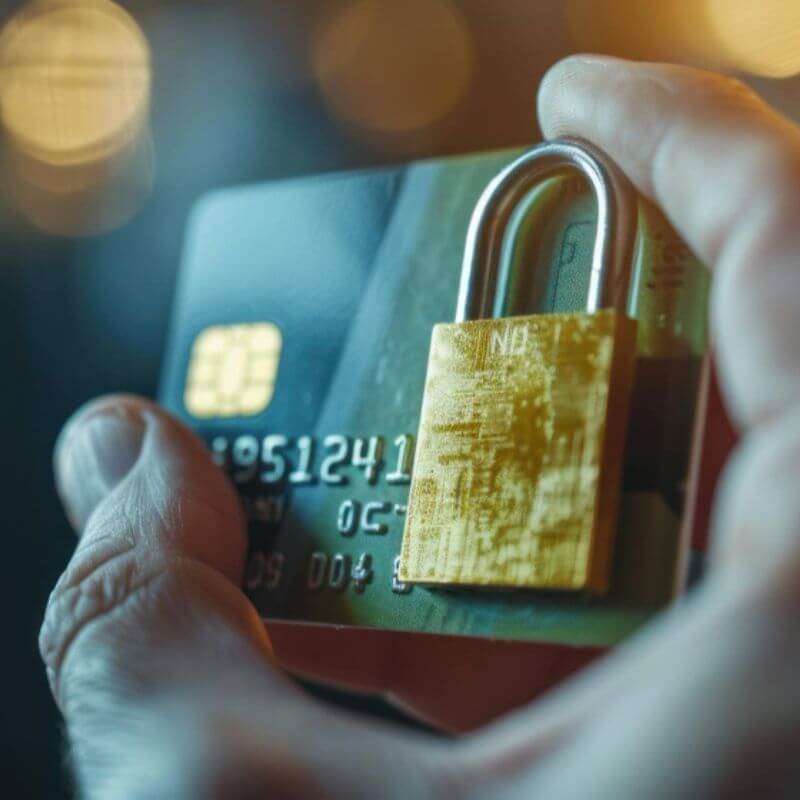Last Updated on October 25, 2025 by Amrita Das
If you want to know what is credit card abuse charge, then read this detailed guide. Here you will learn everything about credit card abuse from different scenarios of credit card fraud to how to save yourself from credit card misuse along with the laws and penalties for credit card abuse in Texas.
Understanding Credit Card Abuse
Credit card abuse, also known as credit card fraud, is a serious offense that occurs when a person uses someone else’s credit card without their permission or knowledge.
This can include activities such as purchasing items with a stolen credit card, possessing someone else’s card with the intent to use it, or selling stolen credit cards.
It is not necessary for the perpetrator to actually use the stolen card for charges to be filed, as simply possessing and intending to use it can result in a conviction. Even using someone else’s credit card number for an online transaction without authorization is considered credit card abuse.
It is important to recognize the severity of this offense and understand that even small actions related to credit card fraud can lead to criminal charges.
Read Also: Credit Cards For International Students Without SSN(Step-by-Step)
Different Scenarios Of Credit Card Fraud
Credit card fraud can occur in various ways, and understanding the different scenarios can help individuals protect themselves from becoming victims. The two main categories of credit card fraud are CNP (Card-not-present) and Card-present fraud, each with its own distinct methods and examples.
CNP( Card-not-present)fraud
CNP fraud is becoming more prevalent as digital payments become more common. This type of fraud occurs when a criminal obtains stolen credit card details and uses them to make online transactions. A typical example is when a large purchase is made quickly to maximize the time available before the fraud is detected.
However, CNP fraud can also happen offline, such as when a fraudster completes a payment form using stolen credit card details and emails it to the retailer. Phishing via email or text messages and intercepting credit card details in public places are other examples of CNP fraud.
Card-present fraud
On the other hand, card-present fraud is becoming less common due to advanced security measures like chip and PIN technology. This type of fraud occurs when a thief physically steals someone’s credit card and uses it for unauthorized transactions.
For instance, credit card theft from homes or people, lost cards left in taxis, and cloning through skimming devices are various examples of card-present fraud.
Additionally, credit cards intercepted in the mail or vulnerable individuals manipulated into revealing their credit card details can also lead to this type of fraud.
Understanding these different scenarios and taking necessary precautions can help individuals protect themselves from becoming victims of credit card fraud. As technology advances, it is crucial to stay vigilant and aware of potential threats to prevent falling prey to credit card fraud.
Additional Reading: Gold Royal Trust Credit Card: A Comprehensive Review
Understanding The Seriousness Of Credit Card Fraud
Credit card abuse is not a light matter in Texas. It is considered a criminal offense and can lead to severe penalties and consequences upon conviction. Whether you are accused, charged, or indicted for credit card theft or fraud, it is crucial to seek legal assistance from an experienced attorney who understands the complexities of this type of case.
The severity of credit card abuse charges varies depending on factors such as how the credit card was obtained, its usage, and the amount charged.
Even a misdemeanor charge could result in mandatory jail time, making it essential to have a strong defense to fight these allegations. Furthermore, a credit card abuse conviction can have long-lasting effects on one’s life, including difficulties in finding employment.
Hiring an experienced criminal defense attorney who has dealt with credit card fraud cases is crucial in navigating the legal system and protecting your rights. They will have the knowledge and skills necessary to build a strong defense and potentially reduce or dismiss the charges against you.
Remember, the consequences of a credit card abuse conviction can last a lifetime, so it is essential to take this matter seriously and seek professional legal help immediately.
How Common Is Credit Card Abuse?
Now that you understand what credit card abuse means, its different scenarios and its seriousness, now you need to know how common it is. Credit card fraud is not just a minor issue, it is a major problem that continues to grow at an alarming rate.
With reports of credit card fraud increasing by 161.7% between 2015 and 2020, it is evident that this type of fraud is on the rise. The numbers speak for themselves – over 1.6 billion records were compromised in a span of 14 years, and the direct losses due to credit card fraud in 2020 were approximately $28.58 billion globally.
This problem is not just limited to one country, as it affects the entire world with projected global losses of $36.13 billion annually by 2024. It’s clear that credit card fraud is a widespread issue that needs to be addressed.
Although banks and merchants are constantly developing new technologies to combat fraud, criminals are finding ways to bypass these measures. As such, it is crucial for the industry as a whole to stay vigilant and continuously adapt in order to combat this ever-evolving threat.
With the constant increase of credit card fraud, it is imperative that individuals also take necessary precautions in safeguarding their personal information and monitoring their credit card activity to prevent falling victim to this prevalent crime.
How Credit Card Abuse Investigated: An Essential Step In Protecting Customers And Businesses
The credit card abuse investigation process is a crucial step in protecting customers and businesses from fraudulent activities. With the growing use of credit cards for transactions, it has become increasingly important for banks to have a streamlined process in place to address any disputes raised by their customers.
This not only ensures a fair and just resolution of the dispute but also helps in preventing any potential losses to both parties involved.
Step 1: The Customer Makes A Complaint
The first step in the credit card fraud investigation process is when the customer makes a complaint to their bank regarding a disputed transaction. This can happen due to various reasons such as unauthorized charges, faulty goods or services, or even due to poor customer service experience.
It is important for banks to provide excellent customer service to prevent customers from filing fraudulent chargebacks out of spite.
Step 2: Provisional Refund
Once a complaint has been raised, the bank initiates a provisional refund to the customer’s account while they investigate the dispute. This not only helps in maintaining good customer relations but also allows the bank to gather relevant information about the transaction.
Step 3: The Bank Examines The Transaction
In this step, the bank closely examines the transaction data related to the customer’s claim. This includes details such as date and time of purchase, location, and amount spent. They also look for any additional evidence provided by both parties involved in the dispute.
This process can be automated using advanced programs such as Verify Order Insight or Ethoca Consumer Clarity, which help in identifying potential fraudulent transactions.
Step 4: The Bank Makes A Decision
Based on the information gathered and evaluated, the bank makes a decision on whether to reject the customer’s claim or file a chargeback on their behalf. This decision is made in accordance with the guidelines set by the card networks, ensuring a fair and impartial judgment.
If the claim is found to be legitimate, the bank takes necessary action to refund the customer while also taking measures to prevent similar fraudulent activities in the future.
Involvement Of Different Entities In Credit Card Fraud Investigation

The investigation process for credit card fraud involves a collaborative effort from various entities. The extent and complexity of the fraud determine the involvement of these parties, with each playing a crucial role in addressing and preventing such scams.
Law Enforcement Agencies
For extensive cases of credit card fraud involving organized criminal activity or spanning multiple jurisdictions, law enforcement agencies such as the FBI or Interpol may be called in. They have the resources and expertise to investigate and catch perpetrators of fraudulent activities.
Payment Networks & Processors
Major payment networks like Visa, Mastercard, and American Express, as well as payment processors, also play a vital role in credit card fraud investigations. Scams can have far-reaching consequences, particularly when they affect a large number of individuals within a specific system.
This is especially true in cases where scammers target credit card users across multiple banks, as the impact can be widespread and severe. These entities work closely with issuing banks to analyze data and identify patterns that may indicate fraudulent activities.
Involvement Of Merchants
Merchants also play an essential role in credit card fraud investigations, particularly if the scam is linked to breaches in their transaction processing systems. Along with banks and other financial institutions, these companies work together to identify and track fraudulent activities.
This collaboration is crucial in protecting customers from potential scams and frauds.
Cybersecurity Expertise
With the rise of online transactions, cybersecurity firms have become increasingly involved in investigating credit card fraud. They possess the necessary expertise to identify perpetrators and enhance the security of compromised systems, ultimately preventing future fraudulent activities.
Role Of Consumer Protection Agencies
Consumer protection agencies, such as the Federal Trade Commission (FTC) in the United States, may intervene in cases of widespread credit card fraud that affects a significant number of consumers. Their role is to ensure a proper investigation and protection of consumer rights, using their knowledge and experience to inform future regulations.
Involvement Of Credit Reporting Agencies
Credit reporting agencies are often notified in cases of credit card fraud to mitigate the risk of further misuse of stolen identities. They closely monitor for any unusual activities and assist victims of identity theft in safeguarding their profiles.
Their involvement also helps protect consumers’ credit history and prevents them from being held liable from a creditor’s standpoint.
Read More: Do Credit Cards Have Routing Numbers? Your Complete Guide
The Current Texas Law Regarding Credit Card Abuse: Texas Penal Code
The current Texas law regarding Credit Card or Debit Card Abuse is outlined in Penal Code Section §32.31, which defines the offense and outlines the different actions that can be considered as credit card fraud.
This section includes a total of eleven points that outline the specific behaviors that are considered illegal when it comes to using or obtaining credit cards or debit cards.
Section (b) of this law outlines that a person commits an offense if they knowingly use a credit card or debit card with the intent to fraudulently obtain a benefit. This includes using a card that does not belong to them or has been expired, revoked, or cancelled.
Another point outlined in the law is that it is considered an offense for someone to use a fictitious credit card or debit card, or to use a fake number or description of a card in order to obtain a benefit. This behavior is considered fraudulent and can result in penalties under this law.
The law also states that it is illegal to knowingly receive a benefit that has been obtained through credit card abuse, even if the person receiving the benefit was not directly involved in the act of fraud.
This is to discourage individuals from knowingly benefitting from illegal activities. Additionally, the law makes it an offense to steal or receive a stolen credit card or debit card with the intent to use, sell, or transfer it.
It is also illegal to purchase a credit card or debit card from someone who is not the issuer, and for a non-issuer to sell a credit card or debit card.
Another point outlined in the law is that it is considered an offense for someone to use a credit card or debit card belonging to another person without their consent, even if they have possession of the card. This includes inducing the cardholder to use their own card to obtain goods or services for the perpetrator’s benefit.
The law also makes it illegal for someone to possess two or more incomplete credit cards or debit cards with the intent to complete them without the issuer’s consent. This includes having a card that has not yet been stamped, embossed, imprinted, or written on by the issuer.
Lastly, it is considered an offense for someone who is authorized by an issuer to furnish goods or services on presentation of a credit card or debit card to knowingly do so using a card obtained through illegal means or that is forged, expired, or revoked.
Failure to furnish goods or services that were promised in writing can also result in penalties under this law. Overall, the current Texas law on Credit card or Debit card abuse is extensive and covers a wide range of behaviors related to credit card fraud.
It aims to prevent and punish individuals who use fraudulent means to obtain benefits, as well as those who knowingly benefit from such illegal activities. It is important for all individuals to be aware of this law and ensure that they are using credit cards and debit cards ethically and responsibly.
How Can One Be Charged With A Credit Card Abuse Crime In Texas?

In Texas, individuals can be charged with Credit card or Debit card abuse if they are believed to have violated any subsection (b)(1)-(11) of the state’s law.
This means that the prosecution must prove that certain elements, such as knowingly using a fraudulent card or obtaining a credit/debit card without consent, were present in order to charge someone with this offense.
Additionally, the prosecution must prove that these actions were committed with the intent to obtain a benefit or defraud the cardholder.
Being charged with Credit card or Debit card abuse in Texas can have serious consequences, so it is important to understand the elements that must be proven for this charge and to seek legal representation if you are facing such charges.
Punishment Or Credit Card Abuse Charge In Texas
The punishment for credit card abuse can vary depending on the state and severity of the offense. In Texas, the penalty for this crime can range from a fine of $10,000 or more to a prison sentence of 6 months to 10 years.
It is important to note that even if you are not directly involved in committing credit card fraud, but knowingly receive goods or services obtained through it, you can also be charged with credit card abuse.
Related: Credit Card Abuse Laws In Texas: Here’s What You Need To Know
Understanding Statute Of Limitations For Credit Card And Debit Card Abuse In Texas
In the state of Texas, the statute of limitations for credit card or debit card abuse is seven years. This means that after an alleged incident of fraud or misuse of a credit or debit card, the prosecution has seven years to file charges against the defendant.
This time period begins from the date of the offense or from when the crime was discovered.
This limitation period is set in place to ensure that cases are brought to court in a timely manner, as evidence and witnesses may become unavailable over time. It also serves to protect individuals from being unfairly accused of a crime long after it occurred.
It is important for individuals to be aware of the statute of limitations for credit card and debit card abuse in Texas, so they can take appropriate legal action if necessary.
Understanding The Probation For Credit Card Or Debit Card Abuse In Texas
The state of Texas has specific laws and regulations in place to address the issue of credit card or debit card abuse. The Texas Code of Criminal Procedure allows for both judges and juries to grant probation for these offenses, with judges also having the option to accept deferred adjudication plea deals.
However, there are certain circumstances in which probation may not be granted. If the defendant used or exhibited a deadly weapon during the commission of the offense, or immediately after fleeing, then probation cannot be granted.
Additionally, if the defendant was aware that a deadly weapon would be used or exhibited during the offense and still participated in it, they will also not be eligible for probation. It is important to note that probation is not automatically granted for credit card or debit card abuse in Texas.
The decision ultimately lies with the judge or jury, and they will take into consideration factors such as the severity of the offense, any previous criminal history, and the likelihood of rehabilitation.
In cases where probation is granted, it may include certain conditions such as restitution payments to the victim, community service, and regular check-ins with a probation officer. Failure to comply with these conditions could result in the revocation of probation and potentially lead to incarceration.
How To Save Yourself From Credit Card Misuse?
As I discussed earlier, credit card fraud is a common occurrence in today’s digital age, and it is imperative that credit card users take the necessary precautions to protect themselves. Here are some steps you can take to protect yourself from credit card fraud:
Monitor your credit card transactions regularly
One of the easiest ways to detect fraudulent activity on your credit card is by monitoring your transactions regularly. Most banks, including Standard Chartered, allow you to track your transactions through SMS alerts or online banking. By keeping an eye on your spending, you can quickly identify any unauthorized charges and report them immediately.
Keep your credit card information confidential
Never share your credit card information over the phone, through text messages, or email. Scammers often pose as legitimate businesses and ask for sensitive information to carry out fraudulent activities. Always remember that your bank or credit card provider will never ask for this information from you.
Use strong passwords
When making online purchases, ensure that you use a combination of upper and lower case letters, numbers, and special characters in your password. Avoid using easily guessable passwords like birthdates or names of family members. Memorize your password instead of writing it down to prevent any security breaches.
Double-check the website’s legitimacy
Before making an online purchase, make sure that the website is legitimate and secure. Check for the ‘https://’ in the address bar and look for any spelling errors or inconsistencies in the web address.
It is also advisable to check if another website with a similar name exists, as scammers often create fake websites to trick unsuspecting users.
Report lost or stolen cards immediately
If you lose your credit card or notice any unauthorized transactions, report it to your service provider immediately. The sooner you inform them, the quicker they can take action to prevent further fraud. Keep your card provider’s contact number handy to avoid any delays in reporting a lost or stolen card.
Invest in an RFID-blocking wallet
Contactless credit cards come with an RFID chip that allows for easy transactions without swiping the card. However, this technology also makes it easier for fraudsters to scan your card’s data while standing next to you. To prevent this, consider investing in an RFID-blocking wallet that will protect your card’s information from being scanned.
Additional Reading: Value City Furniture Credit Card Explained
Conclusion
Therefore, it’s important to understand the legal definition of credit card abuse and its consequences, as well as take necessary precautions to protect yourself from falling victim to it. Remember, if you ever suspect that your card has been compromised, contact your bank immediately to prevent any further damage.
Stay safe and be mindful of your financial transactions to avoid falling victim to credit card abuse. Therefore, I hope this guide will be helpful to you a lot. Thanks for reading this guide about What is credit card abuse charge”.

